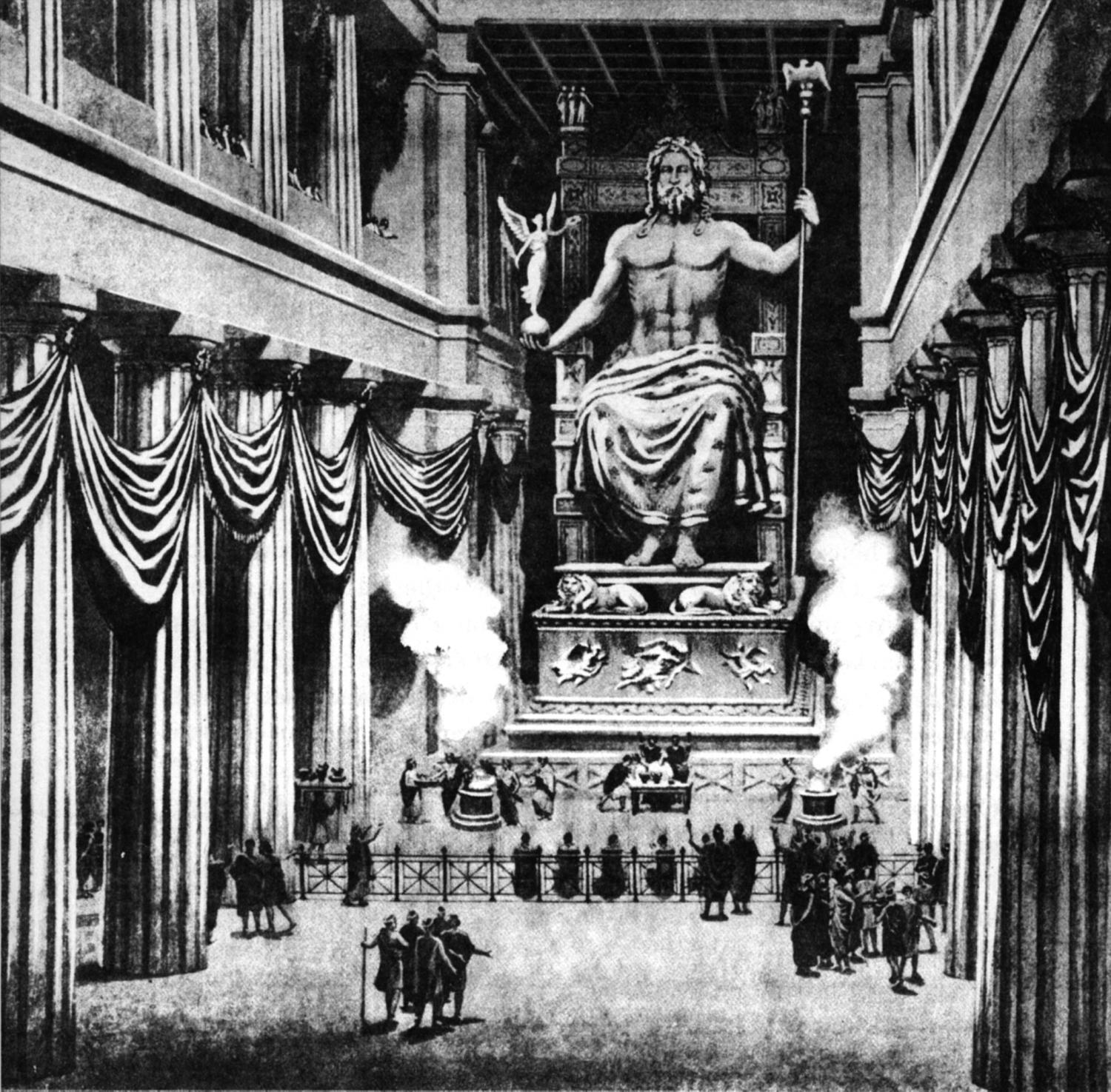The god Jupiter
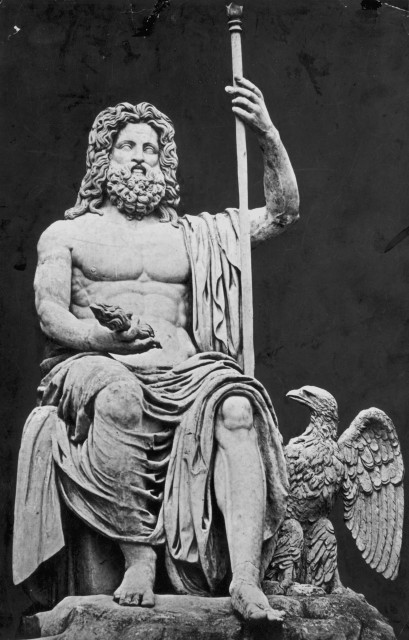
Jupiter is the father and leader of all the gods in the ancient Roman pantheon. Jupiter was the god whose word and judgement was law, and he was the one who settled the disputes and conflicts of the other gods.
Called Zeus in Greek, his patrimony included many gods and the semi-divine heroes of Roman and Greek history and mythology including Ares, Hebe, Hephaestus, Aphrodite, Apollo, Artemis, Persephone, Dionysius, Perseus, Heracles, Helen of Troy, Minos, and the Muses.
Jupiter as the father-god is an important spiritual archetype that is related to Kether of the Kabbalistic Tree of Life, the creative and governing force that rules all the other gods and divine forces of existence.
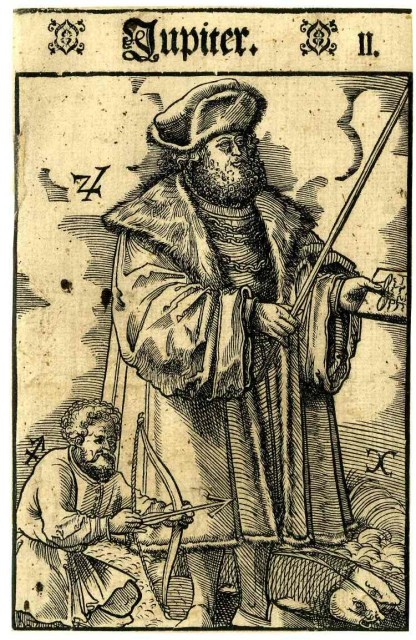 Jupiter is the supreme god of the Roman pantheon, called dies pater, “shining father”. He is a god of light and sky, and protector of the state and its laws. He is a son of Saturn and brother of Neptune and Juno (who is also his wife). The Romans worshipped him especially as Jupiter Optimus Maximus (all-good, all-powerful). This name refers not only to his rulership over the universe, but also to his function as the god of the state who distributes laws, controls the realm and makes his will known through oracles.
Jupiter is the supreme god of the Roman pantheon, called dies pater, “shining father”. He is a god of light and sky, and protector of the state and its laws. He is a son of Saturn and brother of Neptune and Juno (who is also his wife). The Romans worshipped him especially as Jupiter Optimus Maximus (all-good, all-powerful). This name refers not only to his rulership over the universe, but also to his function as the god of the state who distributes laws, controls the realm and makes his will known through oracles.
The largest temple in Rome was that of Jupiter Optimus Maximus on the Capitoline Hill. Here he was worshipped alongside Juno and Minerva, forming the Capitoline Triad. Temples to Jupiter Optimus Maximus or the Capitoline Triad as a whole were commonly built by the Romans at the center of new cities in their colonies. His temple was not only the most important sanctuary in Rome; it was also the center of political life. Here official offerings were made, treaties were signed and wars were declared, and the triumphant generals of the Roman army came to give their thanks.
Other titles of Jupiter include: Caelestis (heavenly), Lucetius (of the light), Totans (thunderer), Fulgurator (of the lightning). As Jupiter Victor he led the Roman army to victory. Jupiter is also the protector of the ancient league of Latin cities. His attribute is the lightning bolt and the eagle is both his symbol and his messenger.
The Romans regarded Jupiter as the equivalent of Greek Zeus, and in Latin literature and Roman art, the myths and iconography of Zeus are adapted under the name Iuppiter. In the Greek-influenced tradition, Jupiter was the brother of Neptune and Pluto. Each presided over one of the three realms of the universe: sky, the waters, and the underworld. The Italic Diespiter was also a sky god who manifested himself in the daylight, usually but not always identified with Jupiter. Their Etruscan counterpart was Tinia. It was once believed that the Roman god Jupiter (Zeus in Greece) was in charge of cosmic Justice, and in ancient Rome, people swore to Jove in their courts of law, which lead to the common expression “By Jove,” that many people use today. (source)
The planet Jupiter
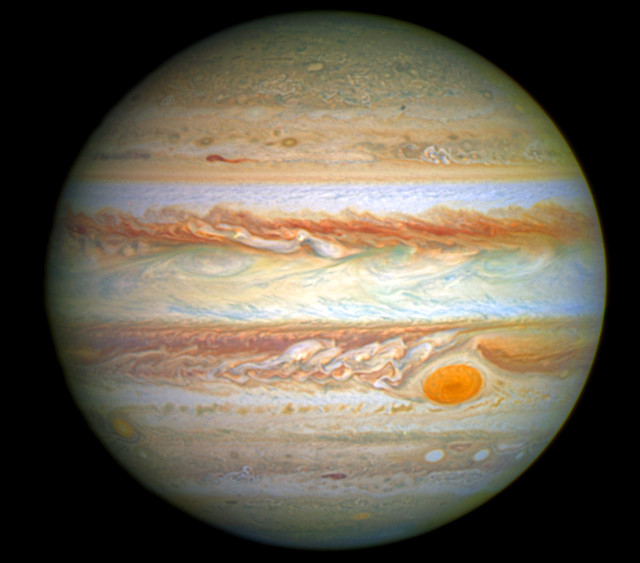 Jupiter is the fifth planet from the Sun and the largest planet in the solar system, about 12 times larger than the Earth, and has at least 67 moons. The atmosphere of Jupiter often has lightning and thunder storms, hearkening to the god Jupiter’s role as ruler of thunder and lightning, who is often seen brandishing a lightning bolt.
Jupiter is the fifth planet from the Sun and the largest planet in the solar system, about 12 times larger than the Earth, and has at least 67 moons. The atmosphere of Jupiter often has lightning and thunder storms, hearkening to the god Jupiter’s role as ruler of thunder and lightning, who is often seen brandishing a lightning bolt.
Tin is the metal of Jupiter
Tin has historically been used as a vessel for preserving foods and Jupiter is said to bring an influence of preserving youth and optimism.
Tin is a malleable, ductile, highly crystalline, silvery-white metal whose crystal structure causes a “tin cry” when a bar of tin is bent (caused by crystals breaking). Tin acts as a catalyst when oxygen is in solution and helps accelerate chemical attack. Tin as an elemental alchemy symbol is representative of the planet Jupiter. Being ruled by Jupiter, tin is in connection with the breath, and can be philosophically viewed as the breath of life. Tin also adds a philosophical lesson to life that standing alone it is weaker than if it is combined with another alchemy symbol element. (source)
Jupiter in Astrology
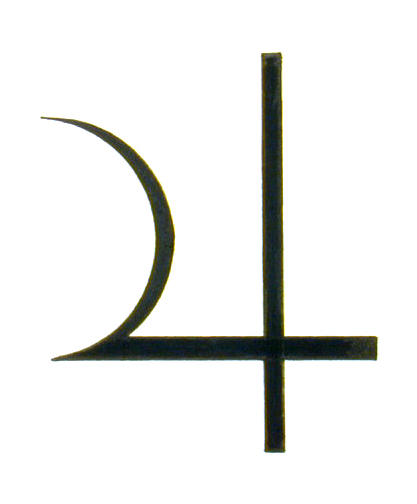 Jupiter brings benevolence, generosity, an expanded worldview and faith in something greater than oneself. Jupiter governs the astrological signs Sagittarius and Pisces, both known for their philosophical and spiritual natures and the urge to go beyond the small self to find meaning in the world.
Jupiter brings benevolence, generosity, an expanded worldview and faith in something greater than oneself. Jupiter governs the astrological signs Sagittarius and Pisces, both known for their philosophical and spiritual natures and the urge to go beyond the small self to find meaning in the world.
While Sagittarius seeks meaning through philosophy, religion, higher education and travel, Pisces seeks complete mystical transcendence, the ultimate expression of expansion by dissolving all boundaries.
Jupiter governs all leaders and rulers, especially priests or priest-kings who act as intermediaries between humans and the divine. The symbol of Jupiter is the crescent of the soul placed above the cross of matter, showing the constant reconciliation of the spiritual urges of the soul with the practical matters of life, but with the soul being the guiding light of life rather than the necessities of life dictating and limiting the spiritual.
Hence Jupiter’s strong association with philosophy, religion, government and law: all of these endeavors rely on drawing on a source greater than the small self to bring wisdom and faith into daily life.
Jupiter is called the great beneficent, while Venus, traditionally associated with romantic love, is the lesser beneficent. The expansive and optimistic influence of Jupiter brings a love that is universal and transcendent, the love of God, the love of all people and a strong sense of the inherent goodness in the universe.

